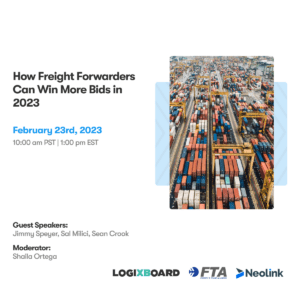In this article
What we’re covering ?
- Retailers in the US hoping to slash shipping costs when re-negotiating long-term shipping contracts ?
- This week’s featured news stories, including why companies are slow to adapt to completely robotic “dark” warehouses ?
- Maersk and MSC 2M alliance to be discontinued once it expires in 2025 ?
- Logixboard’s featured content & upcoming webinar ??
IN THE NEWS
Retailers Looking To Bargain Lower Ocean Freight Rates When Renegotiating Contracts
In 2020-21, as the COVID-19 pandemic hit the world, demand surged. With lockdowns all over the world in place, freight rates increased. But in 2022, the demand surge finally abated, as various stakeholders scrambled to deal with inflationary pressures. As a consequence, now in 2023, it seems prices have finally relented, allowing supply chains to recover slightly. Now as the time to renegotiate long-term contracts with ocean carriers comes up, retailers in the US hope to slash shipping costs and save millions.
According to Xeneta, a Norway-based transportation data firm, the average contract cost of shipping a container from China to the US West Coast was $2,618 as of Feb. 9. This figure indicates lower freight demand as the result of retailers cutting orders and consumer spending declining. The rate rose to $8,607 on April 1, 2022, from $3,174 a year earlier. During that time, importers were scrambling to secure space on ships for the summer and fall seasons. Many even signed contracts at double the previous year’s rates, according to shippers.
TOP HITS THIS WEEK
From The Manifest
LOGIXBOARD INSIDER
Learn how to drive MORE business this year with tips and advice from freight experts ?
Join us this Thursday at our webinar “How Freight Forwarders Can Win More Bids in 2023,” to hear from FTA’s Sal Milici, Neolink’s Sean Crook, and Logixboard’s own Jimmy Speyer on this year’s trends and best practices ?
WHAT’S HAPPENING AROUND THE WORLD
Featured News Stories
- Companies are slow to adopt robot-operated ‘dark’ warehouses, despite being able to save costs. Limits to robotic technology are hampering efforts to create fully automated fulfillment centers, according to operatives.
- FreightWaves Supply Chain Pricing Power Index this week indicates that tender volumes are remaining constant, however, carriers — both large and small — are still suffering from the excess capacity.
- It looks like it will get worse in Los Angeles before it gets better. Beleaguered Los Angeles port pins hope on the 2nd-half to rebound. January imports at the LA Port are down 13% year on year, 10% versus pre-pandemic levels.
- Convoy is laying off workers as part of a restructuring. The Seattle-based digital freight network that connects truckers with shippers, is shuttering its Atlanta office. This is the third time in less than a year that Convoy has laid off workers.
ON OUR RADAR
Maersk and MSC 2M Alliance To Be Discontinued Upon Expiration in 2025
Maersk and MSC announced that they would not continue their 2M alliance once it expires in 2025. The vessel-sharing agreement, which began in 2015 and prompted a wave of consolidation in the industry, allowed the two companies to better manage capacity by pooling cargo. Although the 2M alliance has drawn scrutiny from federal regulators over potential anticompetitiveness issues, the carriers say they decided to end their agreement as they pursue individual strategies. Maersk, for example, has invested heavily to expand beyond ocean shipping and become an end-to-end supply chain provider.
Experts say that the end of 2M could lead to capacity shifts and spark other carriers to rethink their alliances. The breakup is expected to spark increased competition from ocean carriers and will have other companies rethinking their alliances.
In the short term, this will mean increased competitive pressure between the carriers which all else equal results in rates that are lower than they otherwise would have been. Those lower rates, however, could come at the expense of more volatile service and a higher number of blank sailings. Meanwhile, other shipping lines too may be sparked to rethink their alliances after this split.
Ending the alliance will also push Maersk to double down further on services beyond ocean shipping. Because of its size, it’s unlikely the carrier could join another ocean alliance without drawing scrutiny from regulators. Meanwhile, MSC has doubled down on ocean shipping. The company upped its capacity through new vessel orders and by aggressively raiding the second-hand and charter markets, according to a Drewry report.
That’s all we’ve got for this week!
Thanks for reading,
The LXB team ✌️



